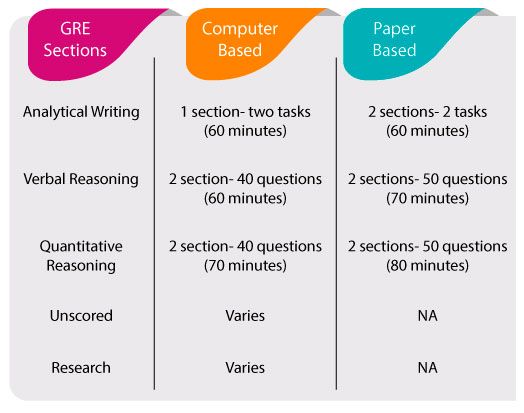If you're considering applying to graduate school, chances are you've come across the term "GRE" in your research. The GRE, or Graduate Record Examinations, is a standardized test that is widely used by graduate schools in the United States and many other countries as part of their admissions process. Whether you're planning to pursue a master's or doctoral degree, understanding the basics of the GRE is crucial to ensure you're well-prepared for this important test.
In this comprehensive blog, we will demystify the GRE by providing an in-depth guide on its format, content, scoring, and preparation. From understanding the different sections of the GRE to learning about the scoring system and effective preparation strategies, this blog will equip you with the knowledge you need to tackle the GRE with confidence and achieve your best possible score. So let's dive in and explore what the GRE test is all about!
Format of the GRE Test
The GRE is a computer-based test that consists of three main sections: Verbal Reasoning, Quantitative Reasoning, and Analytical Writing. In addition to these sections, there may also be an unscored research section or a scored experimental section, which are used for testing new questions and do not count toward your final score.
The format of the GRE is as follows:
Verbal Reasoning
This section measures your ability to analyze and evaluate written material and synthesize information from it. It consists of two sections, each containing 20 questions, and you have 35 minutes to complete each section. The questions in this section test your vocabulary, reading comprehension, and critical reasoning skills.
Quantitative Reasoning
This section measures your ability to understand, interpret, and analyze quantitative information, as well as solve problems using mathematical concepts and techniques. It also consists of two sections, each containing 20 questions, and you have 35 minutes to complete each section. The questions in this section cover topics such as arithmetic, algebra, geometry, and data analysis.
Analytical Writing
This section measures your ability to articulate complex ideas, support your arguments with evidence, and effectively communicate your thoughts in writing. It consists of two tasks: Analyze an Issue and Analyze an Argument. You have 30 minutes to complete each task.
Unscored Research Section or Scored Experimental Section
As mentioned earlier, there may be an unscored research section or a scored experimental section included in your GRE test. The unscored research section is used to test new questions and is not included in your final score. The scored experimental section, on the other hand, is a valid section of the test and is included in your final score. However, you will not know which section is the experimental section, as it is randomly assigned.
Overall, the GRE test takes approximately 3 hours and 45 minutes to complete, including breaks. It is important to familiarize yourself with the format of the test and the types of questions you may encounter in each section to be better prepared on test day.
Content of the GRE Test
The content of the GRE test is designed to assess your verbal, quantitative, and analytical writing skills.
Let's take a closer look at each section and the type of questions you may encounter in the GRE test:
Verbal Reasoning
The Verbal Reasoning section measures your ability to understand and analyze written material, as well as evaluate arguments and draw conclusions. The questions in this section may include reading comprehension passages, sentence equivalence questions, and text completion questions. Reading comprehension passages may be on a variety of topics, such as science, history, social sciences, and literature. Sentence equivalence questions require you to choose two words or phrases that are equivalent in meaning and can complete a sentence in a coherent manner. Text completion questions involve filling in the blanks in a passage with the most appropriate words or phrases.
Quantitative Reasoning
The Quantitative Reasoning section assesses your ability to understand, interpret, and analyze quantitative information, as well as solve problems using mathematical concepts and techniques. The questions in this section may cover topics such as arithmetic, algebra, geometry, and data analysis. You may encounter multiple-choice questions, where you need to select one correct answer from multiple options, and numeric entry questions, where you need to enter a numeric value.
Analytical Writing
The Analytical Writing section measures your ability to articulate complex ideas, support your arguments with evidence, and effectively communicate your thoughts in writing. It consists of two tasks:
Analyze an Issue
In this task, you are presented with a statement or an issue, and you are required to analyze and evaluate it, and provide your own perspective on the topic.
Analyze an Argument
In this task, you are presented with an argument, and you are required to critically analyze the reasoning provided in the argument, identify its strengths and weaknesses, and provide evidence to support your evaluation.

Scoring on the GRE Test
The GRE test is scored on a scale of 130 to 170, in one-point increments, for the Verbal Reasoning and Quantitative Reasoning sections. The Analytical Writing section is scored on a scale of 0 to 6, in half-point increments. The scores for the Verbal Reasoning and Quantitative Reasoning sections are combined to give you a total score, which ranges from 260 to 340.
The scoring of the GRE test is based on the number of questions you answer correctly, with no penalty for guessing. Therefore, it is important to attempt all questions to maximize your chances of getting a higher score. The unscored research section and the scored experimental section, if included in your test, do not contribute to your final score.
In addition to the raw scores, you will also receive percentile ranks, which indicate the percentage of test-takers who scored below you. For example, if your percentile rank is 90%, it means that you scored higher than 90% of test-takers. Percentile ranks can be helpful in understanding how your score compares to that of other test-takers.
Preparing for the GRE Test
Preparation is key to performing well on the GRE test. Here are some tips to help you prepare effectively:
- Familiarize yourself with the test format and content: Understand the structure of the GRE test, the types of questions you may encounter in each section, and the time limits for each section. Review the content areas, such as verbal, quantitative, and analytical writing, and identify your strengths and weaknesses.
- Create a study plan: Develop a study plan that suits your schedule and learning style. Allocate time for each section of the test and set specific goals for what you want to achieve in your study sessions. Stick to your plan and track your progress to ensure you are staying on track.
- Practice with official GRE materials: The official GRE website provides a wealth of resources, including sample questions, practice tests, and test prep materials.
- Review basic concepts: Brush up on your foundational knowledge in areas such as arithmetic, algebra, geometry, and vocabulary. Review key concepts and practice solving problems to build your skills and confidence.
- Take practice tests: Practice tests are a crucial part of GRE preparation. Take official practice tests from the GRE website or use other reputable sources to simulate the test-taking experience. Analyze your performance, identify areas that need improvement, and adjust your study plan accordingly.
- Develop test-taking strategies: Familiarize yourself with effective test-taking strategies, such as time management, guessing strategies, and elimination techniques. These strategies can help you approach questions efficiently and increase your chances of selecting the correct answer.
- Strengthen your writing skills: The Analytical Writing section requires you to effectively communicate your ideas in writing. Practice organizing your thoughts, developing coherent arguments, and supporting them with evidence. Seek feedback from others to improve your writing skills.
- Manage test day stress: Test day can be stressful, so it's important to manage your stress levels. Get a good night's sleep before the test, eat a nutritious breakfast, and arrive at the test center early to avoid any last-minute rush. Stay calm during the test and use your test-taking strategies to approach questions confidently.
- Review your mistakes: After taking practice tests, thoroughly review your mistakes and understand why you got them wrong. Identify patterns and areas that need improvement, and focus on those during your study sessions. Learning from your mistakes can help you avoid similar errors on the actual test.
- Stay positive and confident: Maintaining a positive mindset and confidence in your abilities can go a long way in helping you perform well on the GRE test. Believe in yourself, stay focused, and approach each question with a clear and calm mind.
In conclusion, the GRE test is a standardized test that assesses your verbal reasoning, quantitative reasoning, and analytical writing skills. It is an important requirement for admission into graduate programs in various fields. Understanding the test format, content, and scoring, and preparing effectively with practice tests, review of basic concepts, and test-taking strategies can greatly increase your chances of achieving a high score. Remember to stay positive, manage test-day stress, and believe in yourself. Good luck with your GRE preparation!

Frequently Asked Questions (FAQs) about the GRE Test:
What is the GRE test?
The GRE test, or the Graduate Record Examination, is a standardized test administered by the Educational Testing Service (ETS) that assesses the verbal reasoning, quantitative reasoning, and analytical writing skills of individuals seeking admission into graduate programs in various fields, including business, engineering, social sciences, humanities, and more.
Who takes the GRE test?
The GRE test is typically taken by individuals who are planning to pursue a graduate or business school degree, such as a Master's or Ph.D., or an MBA program. It is accepted by thousands of graduate programs worldwide, and is a common requirement for admission in many countries.
What is the format of the GRE test?
The GRE test is computer-based and consists of three sections: Verbal Reasoning, Quantitative Reasoning, and Analytical Writing. The Verbal Reasoning section measures your ability to understand, analyze, and evaluate written material. The Quantitative Reasoning section assesses your ability to understand, analyze, and solve quantitative problems. The Analytical Writing section evaluates your ability to articulate complex ideas clearly and effectively in writing.
How long is the GRE test?
The total testing time for the GRE test is approximately 3 hours and 45 minutes, including breaks. The Verbal Reasoning and Quantitative Reasoning sections are each 35 minutes long, and the Analytical Writing section consists of two tasks, each 30 minutes long. There is also a research section or an unscored experimental section, which can be either a Verbal or Quantitative section, that is included for research purposes and does not count towards your score, but adds an additional 35 minutes to the testing time.
How long are GRE scores valid?
GRE scores are valid for five years from the test date. This means that you can use your GRE scores for graduate school admissions for up to five years after you have taken the test. After five years, your scores will no longer be valid, and you would need to retake the GRE test if you wish to use it for admissions.
Can I send my scores to multiple graduate programs?
Yes, you can send your GRE scores to multiple graduate programs or business schools. When you register for the GRE test, you can select up to four graduate programs or business schools to receive your scores for free. If you wish to send your scores to additional programs or schools, there is a fee per recipient. You can also choose to send your scores after you have taken the test, but there will be a fee for each recipient.






